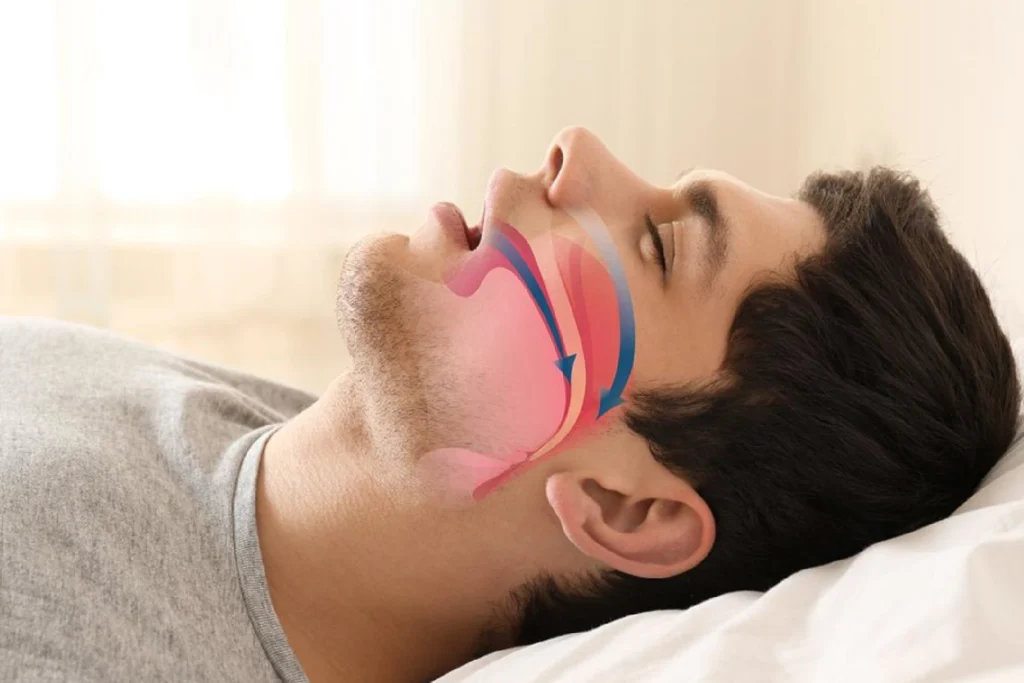Snoring & Sleep Apnea
Snoring is noisy breathing while you are asleep. It's a common occurrence, and for the most part, harmless. However, as the snoring gets loud and more frequent, it might be a cause of concern, not just for the snorer but also for their bed partner.
If you are someone who snores loudly during the night and spends their day time feeling sleepy and tired, it might be a symptom of sleep apnea.

Types of Sleep Apnea
Sleep apnea can be a potentially serious sleep disorder because the breathing repeatedly stops and starts. There are three main types:
Obstructive Sleep Apnea (OSA): This is the most common type and it occurs when the muscles of the throat relax excessively, blocking the flow of air to the lungs.
Central Sleep Apnea (CSA): This form is less common and it occurs when the brain fails to send the correct signals to the muscles that control breathing.
Complex Sleep Apnea Syndrome: Also known as treatment-emergent central sleep apnea, this condition is a combination of obstructive and central sleep apnea.
Symptoms of Sleep Apnea
The symptoms of all three types of sleep apnea can vary, but common signs include:
- Loud snoring, often noticed by a bed partner
- Episodes of stopped breathing during sleep
- Gasping for air during sleep
- Waking up with a dry mouth or sore throat
- Experiencing headaches in the morning
- Difficulty falling and staying asleep (insomnia)
- Excessive daytime sleepiness (hypersomnia)
- Lack of focus while awake
- Feeling irritated and cranky
Recognizing these symptoms early can help manage sleep apnea effectively and prevent complications.
Causes of Sleep Apnea
Many factors may be directly or indirectly responsible for causing sleep apnea like one’s weight, alcohol consumption, allergies, lifestyle, etc.
When we sleep, the muscles of our throat relax. As a result, the passage for air to pass through becomes narrower causing slight obstruction and vibration. The narrower the path becomes, the more forcefully the air passes, causing more intense vibrations, and therefore, louder the snoring.
The following conditions can affect the airway and cause snoring:
- Obesity: Excess weight is a major risk factor, as fat deposits around the upper airway can block breathing.
- Neck Circumference: People with thicker necks might have narrower airways and, hence more likely to have sleep apnea.
- Age: Older people have a weakened upper airway, resulting in a higher chance of sleep apnea. This is why, the older you get the risk of sleep apnea increases.
- Family History: A family history of sleep apnea might increase your risk.
- Smoking and Alcohol Consumption: Smoking and alcohol consumption aggravates the risk of developing sleep apnea.
- Nasal Congestion: If you have difficulty breathing through your nose, you're more likely to develop sleep apnea.
Treatments for Sleep Apnea
Sleep Apnea treatments aim to normalize breathing during sleeping. It may vary depending on the cause and type of sleep apnea.
Some common treatments are:
- Continuous Positive Airway Pressure (CPAP): This is one of the most common treatments for obstructive sleep apnea. A CPAP machine uses a mask that delivers air pressure to keep your airway passages open while you sleep.
- Oral Appliances: These are designed to keep your throat open by bringing your jaw forward.
- Positional Therapy: For some, sleep apnea occurs because they sleep in a certain position. Using devices that prevent sleeping on the back can be helpful.
- Nasal Decongestants or Allergy Treatments: Treating allergies or nasal obstructions can automatically better airflow and reduce sleep apnea symptoms.
- Surgery: If nothing else is effective, various surgical options are available to remove tissue, shrink tissues, or reposition structures.
Snoring can be more than just a disturbance in sleep; it can be a sign of sleep apnea. Understanding the types, symptoms, causes, and treatments of sleep apnea can help you or a loved one get the right care and improve the quality of life.
For effective sleep apnea or snoring treatment, consider visiting one of the best ENT specialists in Mumbai, Dr Shailesh Pandey. He is proficient in sleep apnea treatment and has provided relief to numerous patients facing this. Professional diagnosis and personalized treatment plans can go a long way in managing snoring and sleep apnea, ensuring you get the restful sleep you need.
